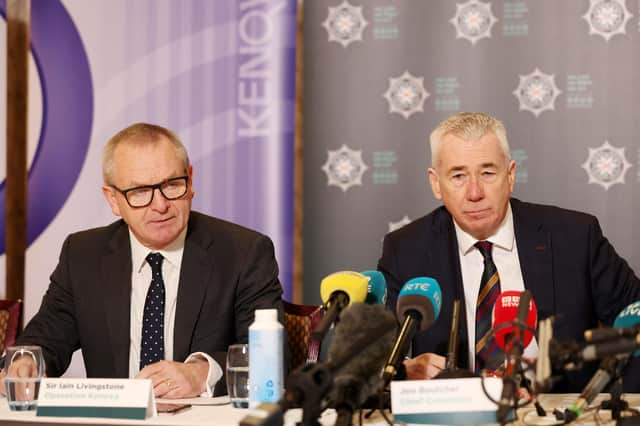Former agent handler: 'we're presumed guilty... until they find us more guilty'


That is the view of former Special Branch officer Dr William Matchett, who said the scenarios described in the Operation Kenova interim report bear no resemblance to the day to day struggle of trying to save lives – often at great personal risk.
“Did I dream everything that I did, because it was absolutely nothing like I’m hearing today?” he said following the launch of the report’s findings in Belfast on Friday.
Advertisement
Hide AdAdvertisement
Hide AdAlthough the seven-year, £40 million investigation was focused on the activities of an agent under the control of a military unit, the wider intelligence community is reported to feel a grave sense of injustice at a perceived lack of understanding.
It was led by Jon Boutcher before he took over as PSNI chief constable in October last year.
The agent Stakeknife was widely believed to be west Belfast man Freddie Scappaticci, who was 77 when he died last year.
"You are presumed guilty until they find you more guilty,” Dr Matchett said.
Advertisement
Hide AdAdvertisement
Hide Ad"What kind of stigma are they attaching to the [agent] handlers? Are they saying we could have prevented the deaths of A, B and C? In my experience we couldn’t have prevented every death.
"It used to be said that nine out of ten attacks or murders were being stopped – now they’re saying that that wasn’t good enough, it should have been ten out of ten.
"Everything has become a lot more preventable, especially with a hefty dose of hindsight. But not in reality.”
Among 10 recommendations in the 208-page report, is a call for the UK authorities to review the application of neither confirming or denying (NCND protocol) that anyone is an agent, ever after they die, linking the “dogmatic” policy with a failure to secure prosecutions in some Troubles cases.
Advertisement
Hide AdAdvertisement
Hide AdThe report also calls on the UK and the republican leadership to apologise to bereaved families and victims of the ISU, the security forces for failings amid a “maverick” culture for handling agents and intelligence; and the republican leadership for the IRA’s abduction, murder and torture of people it suspected of being agents, and linked campaigns of intimidation against their families.
Although the Kenova report suggested Stakeknife may have cost more lives than he saved, it also acknowledges that agents in general saved many lives.
Dr Matchett, author of Secret Victory: The Intelligence War that Beat the IRA, said he was disappointed that so many commentators appear to be focused on blaming those working in the intelligence world for the murders they were working tirelessly to prevent.
He also said he hasn’t heard anybody suggest what could have been done differently to combat the extraordinary terrorist threat.
Advertisement
Hide AdAdvertisement
Hide Ad"What was the alternative? It was imperfect, but this place was in danger of falling apart and becoming a sectarian civil war,” he said.
"And it was incredibly even-handed, because you had both sides in prison in almost equal number.”
Mr Matchett said the difficulty in managing situations where suspected informers had been abducted has not been acknowledged.
"How do you rescue someone who is kidnapped and maybe in the Republic, where a lot of those crimes happened?” he said.
Advertisement
Hide AdAdvertisement
Hide Ad"How do you run surveillance in south Armagh during the hours of daylight?”
Mr Matchett said the track record of the RUC in securing convictions – in a much more difficult environment – compares favourably to the investigation teams struggling to get a single prosecution approved by the PPS.
"Back in the day there were very good [RUC] detectives, with less resources and less time, and they did reach that evidential threshold,” he added.
However, Kevin Winters, a solicitor who represents a number of victims’ families directly impacted by the report, said there now needed to be a public inquiry into the state level of penetration of the IRA.
Mr Winters said Scappaticci was “not the only Stakeknife.”
He went on to describe the report as a “damning indictment on the state”.